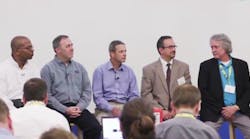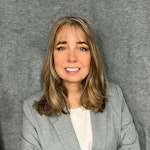Doug Houseman believes that reclosers are the single most important distribution automation product today, and that no one is really working on making the products work together in a fashion that makes it easy to train field workers.
Houseman will bring these ideas to light when he moderates the “Ask the Experts” Manufacturer Panel Discussion at OMICRON’s Second Annual 2017 Recloser Workshop on April 26-27 at the OMICRON Academy Houston Training Center. Eight recloser manufacturers will be on the panel including: ABB, Eaton, Beckwith Electric, G&W Electric, Siemens, S&C Electric, Siemens, Schweitzer Engineering, and NOJA Power.
“This is the first of its kind in our industry whereby we gather together all of the Recloser Manufacturers with many of them being fierce competitors,” said Wayne Bishop, marketing manager at OMICRON. “Audience attendees are able to ask questions and Doug will ask some tough questions as well.”
Houseman is a leader in grid modernization thinking and his extensive experience will be evident when he leads this panel. He has been involved in projects in more than 70 countries and was asked to author significant portions of the IEEE’s GridVision 2050, DOE’s QER and to revise CEATI’s Distribution Utility Technology Roadmap. He is a NIST fellow and member of the GridWise Architecture Council (GWAC) where he had a hand in both the Smart Grid Interoperability Maturity Model and Transactive Energy. He has led the IEEE Power and Energy Society’s Intelligent Grid Coordinating Committee and Emerging Technology Committee for the last five years. He has developed more than 20 tutorials for grid modernization for IEEE and others.
Following is a Q&A with Houseman on how he will push for standardization for reclosers:
Q: How will this "ask the experts" panel address challenges and the future of recloser market?
We hope to ask the experts about standardization of controls, displays, the meaning of “operations”, and messaging – if we can get the discussion started it should start a longer term effort to standardize the remote capability of reclosers.
Q: Are there any specific issues that this panel will touch on?
Standardization is the one I most hope to address.
Q: What questions would you anticipate from the audience, and what will you ask?
My questions will focus on standards, I suspect the audience to ask about costs of electronic reclosers and improving maintenance needs. I also expect that there may be questions about manuals, and how to questions about specific schemes
Q: How crucial are reclosers to the new grid?
They are the first line of reducing outage and transferring load. If we do it right, they should help with management of renewables as well. They may be the core item for connecting microgrids, storage, larger PV systems and other customer owned equipment.
Q: When and why did you decide to go into your particular career field?
By my 9th birthday, I had decided I wanted to be an engineer and join the Navy. I managed to succeed at both. While my Navy career ended early, my engineering career is still going strong. I really wanted to help people, and the combination of being an engineer to find solutions and to be in the Navy to be able to do it globally were the prime drivers for me as a 9 year old.
Q: Best thing about your job right now?
The vast network of people I have met over the last 40 years, and the ability to work with that network to help make changes in the world that will benefit my grandchildren.
Q: What courses have you been involved in?
I helped develop more than a dozen tutorials for IEEE PES on grid-related topics. Many of the courses have been handed off to others, to further develop and present. I enjoy the challenge of creating new and useful courses, then handing them off to a young engineer to perfect and teach. This gives the young engineer a platform to learn, teach, and grow on.
Q: What's the most important thing you’ve learned in your past experience that you want to communicate to participants?
Each person is different with different needs. You have to listen carefully to not only the question they ask, but how they ask it. You need to treat everyone as a unique individual with unique needs, while also keeping the focus on the topic at hand and weaving the needs of that student into the wider narrative.
Q: What do you like to do in your spare time?
I read science fiction and build and fly high-power model rockets.
Q: Anything else you would like to add about your teaching philosophy?
I try to set aside 30% of the class time for question and answers, and encourage people to stop me and ask questions mid-sentence. It can be distracting but it means that the students are engaged and challenging the conventional wisdom.



